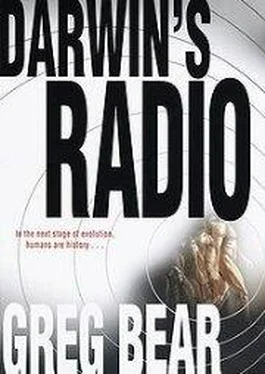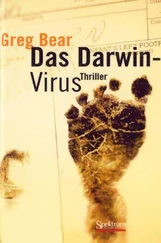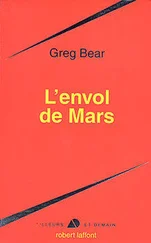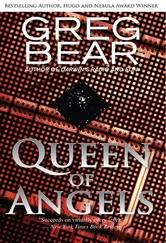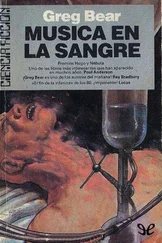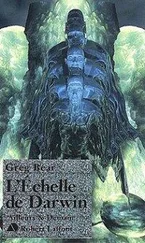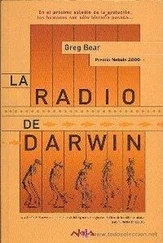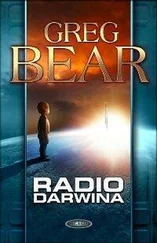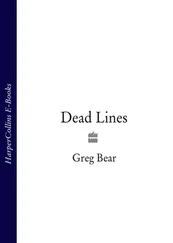The governor of Florida, standing next to them, grimaced and shook his head in some embarrassment.
The agents were mere feet away.
Oh, Dicken thought, nothing more; just a blank and prescient awareness of being suspended in time, a train whistle not yet heard, brakes not yet pressed, arm willed to move but as yet limp by his side.
He thought perhaps he should get out of the way.
The blond young man in a black robe wore a green surgical mask and kept his eyes lowered as he advanced up the hill to the compass rose. He was escorted by three women in brown and green, and he carried a small brown cloth bag tied with golden rope. His wispy, almost white hair blew back and forth in the breeze that was quickening on the hill.
The circles of women and men parted to let them through.
Mitch watched with a puzzled expression. Kaye stood with arms folded beside him. “What are they up to?” he asked.
“Some sort of ceremony,” Kaye said.
“Fertility?”
“Why not?”
Mitch mulled this over. “Atonement,” he said. “There are more women than men.”
“About three to one,” Kaye said.
“Most of the men are older.”
“Q-Tips,” Kaye said.
“What?”
“That’s what young women call men who are old enough to be their fathers,” Kaye said. “Like the president.”
“That’s insulting,” Mitch said.
“It’s true,” Kaye said. “Don’t blame me.”
The young man was hidden from their view as the crowd closed again.
A large burning hand picked up Christopher Dicken and carried him to the back of the wall. It shattered his eardrums and collapsed his chest. Then the hand pulled back and he slumped to the floor. His eyes flickered open. He saw flames rush along the crushed ceiling in concentric waves, tiles falling through the flames. He was covered with blood and bits of flesh. White smoke and heat stung his eyes, and he shut them. He could not breathe, could not hear, could not move.
The chanting began low and droning. “Let’s go,” Mitch told Kaye.
She looked back at the crowd. Now something seemed wrong to her, as well. The hair on her neck rose. “All right,” she said.
They circled on a walkway and turned to walk down the north side of the hill. They passed a man and his son, five or six years old, the son carrying a kite in his small hands. The boy smiled at Kaye and Mitch. Kaye looked at the boy’s elegant almond eyes, his long close-shaven head so Egyptian, like a beautiful and ancient ebony statue brought to life, and she thought, What a beautiful and normal child. What a beautiful little boy.
She was reminded of the young girl standing by the side of the street in Gordi, as the UN caravan left the town; so different in appearance, yet provoking such similar thoughts.
She took Mitch’s hand in hers just as the sirens began. They looked north toward the parking lot and saw five police cars skidding to a halt, doors flung open, officers emerging, running through the parked cars and across the grass, up the hill.
“Look,” Mitch said, and pointed at a lone middle-aged man dressed in shorts and a sweatshirt, talking on a cellular phone. The man looked scared.
“What in hell?” Kaye asked.
The droning prayer had strengthened. Three officers rushed past Kaye and Mitch, guns still bolstered, but one had pulled out his baton. They pushed through the outer circles of the crowd on the top of the hill.
Women shrieked abuse at them. They fought with the officers, shoving, kicking, scratching, trying to push them back.
Kaye could not believe what she was seeing or hearing. Two women jumped on one of the men, shouting obscenities.
The officer with the baton began to use it to protect his fellows. Kaye heard the stomach-twisting chunk of weighted plastic on flesh and bone.
Kaye started back up the hill, but Mitch grabbed her arm.
More officers plowed into the crowd, batons swinging. The chanting stopped. The crowd seemed to lose all cohesion. Women in robes broke away, hands clutched to their faces in anger and fear, screaming, crying, their voices high and frantic. Some of the robed women collapsed and pounded the scruffy yellow grass with their fists. Spittle dribbled from their mouths.
A police van pushed over the curb and over the grass, engine roaring. Two female officers joined in the rout.
Mitch backed Kaye off the mound, and they came to the bottom, facing uphill to keep an eye on the crowd still massed around the sundial. Two officers pushed out of this assembly with the young man in black. Red dripping slashes marked his neck and hands. A woman officer called for an ambulance on her walkie-talkie. She passed within yards of Mitch and Kaye, face white and lips red with anger.
“Goddamn it!” she shouted at the onlookers. “Why didn’t you try to stop them?”
Neither Kaye nor Mitch had an answer.
The young man in the black robe stumbled and fell between the two officers supporting him. His face, warped by pain and shock, flashed white as the clouds against the hard-packed dirt and yellow grass.
Mitch drove them south on the freeway to Capitol Hill, then turned off and headed east on Denny. The Buick chugged up the grade.
“I wish we hadn’t seen that,” Kaye said.
Mitch swore under his breath. “I wish we’d never even stopped.”
“Is everybody crazy? It’s just too much,” Kaye said. “I can’t figure out where we stand in all this.”
“We’re going back to the old ways,” Mitch said.
“Like in Georgia.” Kaye pressed a knuckle against her lips and teeth.
“I hate to have women blame men,” Mitch said. “It makes me want to throw up.”
“I don’t blame anybody,” Kaye said. “But you have to admit, it’s a natural reaction.”
Mitch shot her a scowl that bordered on a dirty look, the first such he had ever given her. She sucked in her breath privately, feeling both guilty and sad, and turned to look out her window, peering down the long straight stretch of Broadway: brick buildings, pedestrians, young men wearing green masks, walking with other men, and women walking with women. “Let’s forget about it,” Mitch said. “Let’s get some rest.”
The second-floor apartment, neat and cool and a little dusty from Mitch’s long absence, overlooked Broadway and gave a view of the brick-front post office, a small bookstore, and a Thai restaurant. As Mitch carried the bags through the door, he apologized for clutter that did not exist, as far as Kaye was concerned.
“Bachelor digs,” he said. “I don’t know why I kept up the lease.”
“It’s nice,” Kaye said, running her fingers along the dark wood trim of the windowsill, the white enamel on the wall. The living room had been warmed by the sun and smelled slightly stuffy, not unpleasant, just closed in. With some difficulty, Kaye opened the window. Mitch stood beside her and closed the window slowly. “Gas fumes from the street,” he said. “There’s a window in the bedroom that looks out over the back of the building. Gets a good draft.”
Kaye had thought that seeing Mitch’s apartment would be romantic, pleasant, that she would learn a lot about him, but it was so neat, so sparely furnished, that she felt let down. She examined the books in a ceiling-high case near the kitchen nook: textbooks on anthropology and archaeology, some tattered biology texts, a box full of science magazines and photocopies. No novels.
“The Thai restaurant is good,” Mitch said, putting his arms around her as she stood before the bookcase.
“I’m not hungry. This is where you did your research?”
“Right here. Stroke of lightning. You were inspirational.”
“Thank you,” she said.
Читать дальше
Конец ознакомительного отрывка
Купить книгу
